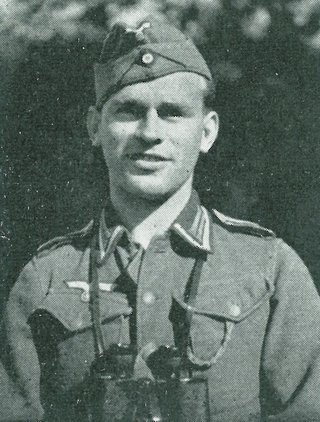Dr. Heinrich Pühringer

Personalia
Born:
Died:
Profession:
Persecution:
Imprisoned 14.10.1944 - 19.12.1944,
Murdered by firing squad on 19.12.1944
Memberships
Curriculum Vitae
Heinrich Pühringer attended grammar school in his hometown of Ried, where he graduated in 1935. He then served as a one-year volunteer in the Austrian army and left as a cadet corporal. He then began studying geography and physical education at grammar school in Innsbruck, with a brief interruption in Munich. In 1936, he joined the student fraternity Austria Innsbruck.
In October 1938, he joined the German army as a non-commissioned officer and was drafted into the mountain troops in January 1940. He successfully completed his studies on March 7, 1940. After obtaining his doctorate, he was employed as an assistant lecturer in Schwaz/Tyrol, but was unable to take up this post because he had to serve in the German Wehrmacht, first in the Landeck Construction Battalion in Tyrol, then from 10.4.1941 in the Construction Replacement Battalion 17. On 4.6.1941 he was transferred to the 7th GJR 136 (Mountain Infantry Regiment), which occupied Norway, and reached the important shipping port of Kirkenes in the border triangle between Norway, Finland and Russia. During the war against the USSR, his unit was involved in a fierce battle in Lapland.
In October 1944, the heavy attacks by the Red Army began, forcing Heinrich Pühringer's unit to retreat step by step. On October 2, a "moderate artillery barrage" fell, resulting in four casualties; from October 7, Heinrich Pühringer's unit was involved in sustained heavy fighting. On the night of October 11, part of the battalion was ordered to the front line. The fighting, in the course of which parts of the unit were scattered, lasted until the morning of October 14.
"The accused marched as ordered, but [...] turned back again because he encountered other soldiers from his battalion who were returning without a plan and who knew nothing of the whereabouts of his company." (from the court judgment).
On the evening of October 12, Heinrich Pühringer reported to the division's collection point for displaced soldiers in Tarnet behind the fighting front and two days later to his company near Tarnet. Heinrich Pühringer is charged with "cowardice before the enemy" at the field court martial.
"The accused denies having left his unit out of fear of personal danger/cowardice. He claimed that he had tried again and again to join his unit, but that no one had been able to tell him anything about its location."
All of Heinrich Pühringer's statements on the matter were regarded as excuses. On 16.11.1944, the trial takes place with the following verdict:
"The sergeant Heinrich Pühringer is sentenced to death and loss of eligibility for military service for cowardice I § 85 MStGB I." From the reasoning, among other things: "3) Through his cowardly behavior, he also made other soldiers fickle and, for whom he should have been a model of willingness to serve, he set the worst possible example. - 4) The defendant's behavior is all the more disgraceful because, as an assistant professor and thus called to lead the youth, he must be expected to do everything in his power to show toughness towards himself and others, especially in difficult combat operations."
On December 3, 1944, the Austrian lawyer and Colonel General Dr. Lothar Rendulic (1887-1971), commander of the 20th Mountain Army in Finland since 1940, who had been a member of the NSDAP since 1932 (illegally at the time), rejected the pardon "in the interest of maintaining manhood. The sentence is to be carried out."
Lothar Rendulic signed the unconditional surrender of Army Group South (Ostmark) with US General Walton Walker in St. Martin i. I. on May 7, 1945. He was "sentenced to 20 years in prison for war crimes and crimes against civilians in Yugoslavia and Norway" in Nuremberg in 1948, pardoned in 1951 and released from prison.
The execution of the sentence took place by firing squad shortly before Christmas on December 19, 1944 in Nystad (Mosjoen county, northern Norway, south of Narvik), according to the Red Cross and the Wehrmacht Information Center (WASt). Heinrich Pühringer was murdered. A grave of Heinrich Pühringer is not known.
Citations
- Krause, Peter/Reinelt, Herbert/Schmitt, Helmut (2020): Farbe tragen, Farbe bekennen. Katholische Korporierte in Widerstand und Verfolgung. Teil 2. Kuhl, Manfred (ÖVfStG, Wien), p. 263/264.
Photo: ÖVfStG
